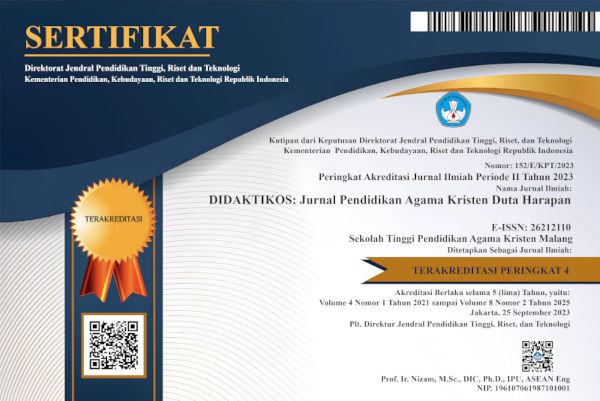Digital Platform Monetization in the Perspective of Christian Education: Integrating Work Values with Technology
DOI:
https://doi.org/10.32490/didaktik.v7i2.222Keywords:
Digital Platform Monetization, Christian Education, Work Values, Digital Economy, Content Creation, Economic Empowerment.Abstract
The rapid growth of digital platform monetization has reshaped the global economy, providing individuals with new avenues for income generation and creative expression. However, these opportunities come with ethical dilemmas, such as content commodification, exploitation, and the erosion of personal authenticity. This study investigates digital monetization from the perspective of Christian education, emphasizing the integration of work values rooted in biblical principles, including diligence, integrity, stewardship, and service. Using a qualitative approach based on a comprehensive literature review, the research explores theological concepts of work, the role of Christian education, and case studies from monetized platforms such as TikTok and YouTube.
The findings demonstrate that digital monetization can foster economic empowerment and innovation, but only when approached ethically. Christian education offers a robust framework for addressing these challenges by promoting moral discernment, digital literacy, and value-driven creativity. Through this lens, monetization can evolve into a means of service, community building, and stewardship, aligning with Christian principles.
The study concludes with recommendations for educators, content creators, and policymakers to prioritize ethical standards and Christian work values in the digital economy. It suggests that future research focus on practical applications of these principles to ensure that technological advancements are leveraged responsibly in diverse sociocultural contexts.References
Fraga-Lamas, Paula, and Tiago M. Fernandez-Carames. “Fake News, Disinformation, and Deepfakes: Leveraging Distributed Ledger Technologies and Blockchain to Combat Digital Deception and Counterfeit Reality.” IT Professional 22, no. 2 (2020): 53–59.
Garner, Stephen. “Theology and The New Media.” In Digital Religion, 266–281. Routledge, 2021.
Hossain, Khandakar Akhter. “Evaluation of Ethical Values To Develop Global Human Resource.” Journal of Liberal Arts and Humanities 4, no. 4 (2023): 1–29.
Hulme, E E. “Reimagining Christian Higher Education.” Christian Higher Education 15, no. 1 (2016): 95–105. https://api.elsevier.com/content/abstract/scopus_id/84953439180.
Hunt, Robert, and Fenwick McKelvey. “Algorithmic Regulation in Media and Cultural Policy a Framework to Evaluate Barriers to Accountability.” Journal of Information Policy 9 (2019): 307–335.
Kopf, Susanne. “‘Rewarding Good Creators’: Corporate Social Media Discourse on Monetization Schemes for Content Creators.” Social Media and Society 6, no. 4 (2020).
Masengwe, Gift, and Bekithemba Dube. “Retrospective and Prospective Approaches to Christian Education in Church of Christ Schools in Zimbabwe.” Religions 14, no. 9 (2023): 1–13.
Mulford, John, and Christel Mbonteh. “Chick-Fil-A: Built on the Values and Worldview of Its Founder.” In Christian Faith Perspectives in Leadership and Business, 199–236, 2024.
Murninghan, Marcy. “Money and Morality: Pathways Toward a Civic Stewardship Ethic.” New England Journal of Public Policy 30, no. 1 (2018): 1–40.
Okediji, Ruth L. “Is the Public Domain Just?: Biblical Stewardship and Legal Protection For Traditional Knowledge Assets.” The Columbia Journal of Law & the Arts 45, no. 4 (2022).
Racelis, A. D. “The Business Leader’s Vocation to Social Purpose and Sustainability.” Journal of Management for Global Sustainability, 10(2), 4. 10, no. 2 (2022): 51–68.
Rugyendo, M. “Practicing a Christian Environmental Ethic Through Stewardship.” Practicing a Christian Environmental Ethic through Stewardship 6, no. 4 (2022): 37–46.
Scolere, Leah, Urszula Pruchniewska, and Brooke Erin Duffy. “Constructing the Platform-Specific Self-Brand: The Labor of Social Media Promotion.” Social Media and Society 4, no. 3 (2018).
Singh, Devin. “Economy and Modern Christian Thought.” Economy and Modern Christian Thought 4, no. 3 (2022): 1–14.
Smith, C. Estelle, Avleen Kaur, Katie Z. Gach, Loren Terveen, Mary Jo Kreitzer, and Susan O’Conner-Von. “What Is Spiritual Support and How Might It Impact the Design of Online Communities?” In Proceedings of the ACM on Human-Computer Interaction, 5:1–42, 2021.
Stoldt, Ryan, Mariah Wellman, Brian Ekdale, and Melissa Tully. “Professionalizing and Profiting: The Rise of Intermediaries in the Social Media Influencer Industry.” Social Media and Society 5, no. 1 (2019).
Taddeo, G., & Diaferia, J. “Media Technologies and Epistemologies: The Platforming of Everything| Economics of Educational Content Creators on Social Media.” International Journal of Communication 18, no. 20 (2024): 4333–4352.
Tene, Omer, and Jules Polonetsky. “Taming the Golem: Challenges of Ethical Algorithmic Decision Making.” North Carolina Journal of Law and Technology 19, no. 1 (2017): 125–173. https://papers.ssrn.com/sol3/papers.cfm?abstract_id=2981466.
Winschiers-Theophilus, Heike, Tariq Zaman, and Colin Stanley. “A Classification of Cultural Engagements in Community Technology Design: Introducing a Transcultural Approach.” AI and Society 34, no. 3 (2019): 419–435.




